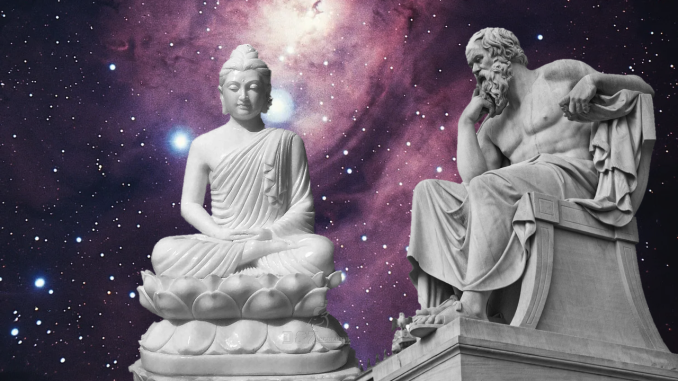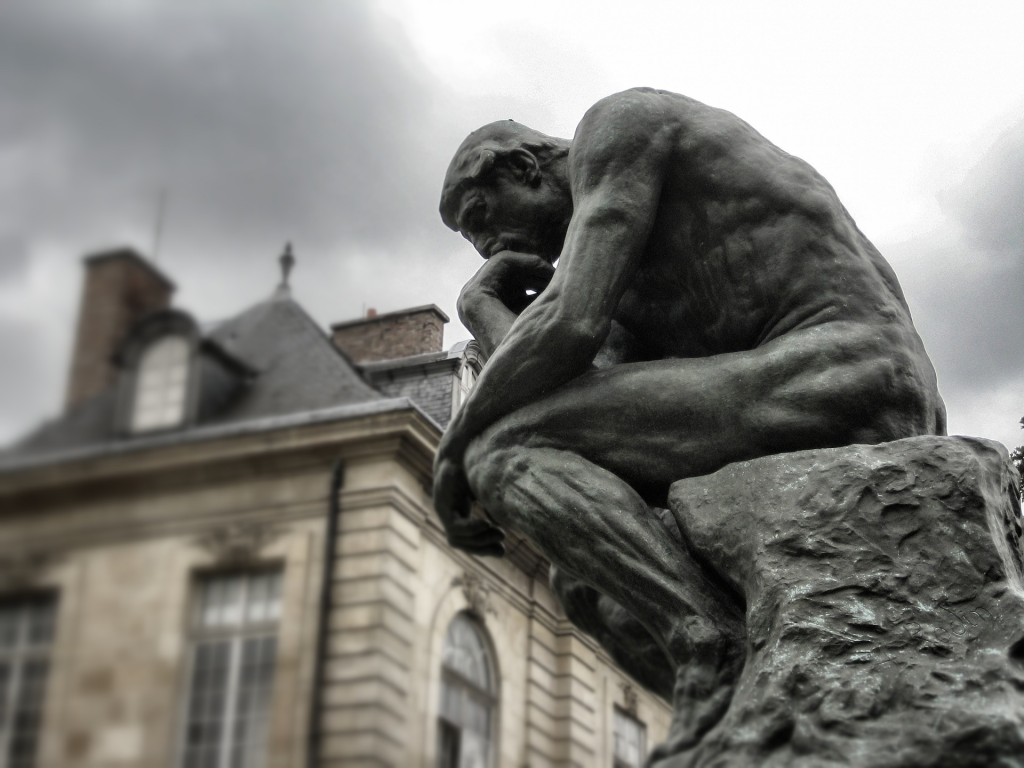
I was recently at a social. Among the various people there, I met a lady. Let’s call her Jessica. She seemed intelligent, witty, attractive, and altogether quite sensible. The conversation was affable enough until she said she believed in angels.
That caught me off guard. It isn’t often these days that one meets urbane, educated women who claim to believe in invisible divine attendants possessing plumes and pinions. The younger version of me would have had something sardonic to say in response. But the older and—I’d like to think—wiser me thought better of it. I knew nothing I said was going to change her mind. So, I simply said to Jessica, “I absolutely believe that you sincerely believe that angels are real. But how do you decide that angels are real but pixies aren’t?” She looked at me square in the face and said in all earnestness, “I believe in pixies too.”
In response, I only said to her with an amiable smile, “Well, now the question is what do you not believe because you seem able to believe almost anything.”
I didn’t pursue the matter, because I’ve given up trying to convince people of anything. Only a withering few individuals are willing to have their minds changed through dialogue, reason, and discourse.
However, it did sadden me that this otherwise bright, intelligent, and eloquent lady with a pleasant demeanour and generous personality had a mind that viewed the world in this way.
It indicated to me both a massive failing of our education system in general and of science education in particular.
A 2014 Gallup poll as reported by TIME magazine indicated that one in five Americans thinks the Sun goes around the Earth. In the same poll, Europeans fared slightly worse.
Thousands of people in the 21st century believe the earth is flat. Thousands of others believe vaccines cause autism.
We may well ask ourselves, what does it matter if someone believes in pixies? Whom are they harming?
Well, it is my considered view that they are harming themselves and they are harming the rest of us.

Everyone is entitled to their own beliefs, not to their own facts.
Of course, I believe that everyone is entitled to their own opinion. In an ideal society, everyone should be free to hold any opinion they like. But I would add to that and say that in an ideal society, everyone should also be able to defend their opinions using reason.
The fundamental question to ask ourselves is whether pixies are real – and how do we know. (In place of pixies we may insert flying unicorns, elves, Santa Claus, aliens or any number of implausible things).
Broadly, there are two ways of gaining insight into reality: scientific investigation and mystical insight.
Scientific investigation is useful for ascertaining facts about the external world. It is the best tool we have for measuring internal subjective perception against external objective reality. Scientific investigation is useful for ascertaining the answer to questions such as “What is the sun made of?” “How far is it to the moon?” “What is an atom?” “How do we overcome Earth’s gravity and launch a rocket into outer space?”
Mystical insight is useful for subjective realizations about who we are, where we are headed, the meaning of life, the purpose of existence, and the function of the universe.
Dr Paul Wang identifies two broad ways of finding meaning and understanding reality:
| Mechanistic Associative meaning Rational explanation Intellectual understanding Modernist paradigm Scientism Self-actualization An end in itself Based on objective values | Spiritual Existential meaning Transcendental explanation Experiential understanding Postmodernist paradigm Science and arts Self-transcendence A means to happiness Subjectively created |
There are some areas of human experience that belong in the mechanistic realm of inquiry. And there are others that belong in the spiritual realm of inquiry.
In my opinion, the determination of whether or not pixies exist is a matter of scientific investigation. It is an empirical claim to say pixies exist. And the onus of proof falls squarely on the person making the claim.

Sagan Standard
The Sagan standard is an aphorism that asserts that “extraordinary claims require extraordinary evidence”.
What it means is simply this: the more mysterious or stranger or hard-to-believe a statement is, the more evidence we should require before we believe it.
If I said I ate cornflakes for breakfast this morning, that’s not an extraordinary claim. It is not unlikely that I ate cornflakes for breakfast.
If, on the other hand, I said I saw a flying unicorn with a rainbow tail, then that is an extraordinary claim. The onus then is on me to prove that I saw it. The burden is not on you to prove that I didn’t see it. At any rate, it’s hard to prove a negative.

Russell’s Teapot
Russell’s teapot is an analogy, formulated by the philosopher Bertrand Russell, to illustrate that the philosophic burden of proof lies upon a person making unfalsifiable claims, rather than shifting the burden of disproof to others.
If someone were to say there is a tiny teapot (invisible to telescopes) in space somewhere between the orbits of Earth and Mars, then the burden of proof lies with the person making such a claim. In this analogy, the teapot stands for any implausible claim – in our case, pixies.

Hitchens’ Razor
Christopher Hitchens riposte to those making implausible claims is this: “What can be asserted without evidence can be dismissed without evidence.”
All this means is that if the person making an extraordinary claim has no evidence, then we need spend no more time discussing the matter with them. Their belief can be dismissed as false.
Subjective Truth and Objective Truth
But what then is truth? Truth is a fact that has been verified. Truth is also conformity to reality.
There are subjective truths and objective truths. A subjective truth is to say, “This room is cold.” This may be true for person A but not necessarily true for person B. An objective truth is to say, “The thermometer says this room is 27 degrees Celsius.” If it is a properly working thermometer and that is, indeed, what it says, then that is an Objective truth (only if the criterion of truth – what a Celsius is – is agreed upon by everyone).
Person A may have seen alien entities during a DMT hallucination. That is their subjective truth. The entities exist in the person’s mind. But to say those alien entities actually exist in external reality is to make an empirical claim and bring it into the domain of objective truth. And for that we need evidence.
A pixie may exist in a person’s mind. That is their subjective truth. But to say that a pixie exists in the external world is to make it an objective truth and that’s where the problem lies.
Scientific Investigation
Michael Shermer, editor at Skeptic Magazine, points out that “Science is the best tool ever devised for understanding how the world works.” In its essence, the scientific method refers to a body of techniques for investigating phenomena, acquiring new knowledge, or correcting errors in previous knowledge.
As the science fiction author, Isaac Asimov points out: “Science is a mechanism. It is a way of trying to improve your knowledge of nature. It is a system for testing your thoughts against the universe and seeing whether they match.” Carl Sagan adds that Science is a way of thinking much more than it is a body of knowledge.
Perhaps the brilliant physicist, Richard Feynman said it best: “The foremost character of science is intellectual honesty. It is fidelity in thought. It’s about ignoring wants or fears and acknowledging what is true. Whatever clarifies the truth is science, whatever obfuscates the truth is dogma.”
There is only one method to determine whether pixies exist in the real world and that is through the scientific method.

The importance of Reason
Our ability to reason, ask questions, raise doubts, clear uncertainties, and find answers that has taken us taken us from being a loose band of fearful hunter-gatherers on the plains of the African Savannah to being intrepid astronauts exploring the dark side of the moon and the infinity of the universe.
Lack of reasoning, on the other hand, has given us superstition, fear, and ignorance.
To feel cheated or outraged when an explanation is given requires a fairly feeble and primitive mind—a mind stuck in gear—a mind that refuses to advance. The sort of mind that believes in pixies. The sort of mind, in fact, which, if we all possessed, would leave our species floundering against the rocks of Bronze Age folly, instead of sailing into the space age as we have.
There is something lamentable about a mind that constantly craves ignorance and strives to remain in deliberate perplexity. It must be admitted that what defines and separates our species from others is our ability to look at the world around us in wonder. It is this sense of wonder that drives us to seek answers and to find explanations. The power of thunder and lightning to inspire awe in us does not diminish because we have explained how they are caused. It would be contemptible, not to say humiliating, to worship such elements of nature.
Reason has moved us from the timid species we were to the intrepid explorers we are. Where once we were cowering in caves at the slightest hint of lightning and convulsing with horror at the faintest shadow of an eclipse, today we send satellites into space and use X-rays to scan the stars.
Where once we thought the moon was a calabash in the sky or worshipped it as a goddess, today we send probes that land on it. Where once we could barely communicate with someone from the next village over the hill, today we send radio waves into the farthest reaches of our galaxy in possible communication with extra-terrestrial intelligence.
There is something infinitely noble in pursuing knowledge—in fulfilling our potential as a species. Our giant brain, with its powerful neocortex and countless trillions of dendritic connections, isn’t meant to sit in feeble stagnation and gibber in fear and wonder. We are meant to go beyond wonder and seek explanations and find causes. It is curiosity that is the hallmark of our species. And curiosity begets discoveries that demand explanations.
Scepticism
What we need to help women like Jessica embrace (as did Socrates) is self-doubt. H. L. Mencken, the journalist and satirist, points out that it is not their willingness to believe that makes men civilised; rather it is their ability to doubt. His contemporary, the philosopher and mathematician, Bertrand Russell pointed out that the problem with the world is that the foolish are cocksure while the wise are full of doubt.
So, the first cognitive enhancement we need to ourselves with – the first tool we need in our thinking kit, if you will – is Scepticism: to be less sure about what they know and to constantly seek evidence for their opinions. Christopher Hitchens, the renowned journalist and provocateur, points out that it is scepticism rather than credulity that is the highest principle that the human intellect can use to ennoble our existence.

The Royal Society
The Royal Society took as its motto the phrase, Nulius in Verba: “Take no one’s word for it.” Ultimately, science – and societies based on the scientific method – triumphed because of this desirable focus on evidence and reason. From primitive times, through the Bronze Age, and down to the medieval era, humanity was driven by cruelty and superstition. Things began to change – and change quite dramatically – during the Enlightenment and the Age of Reason.
The Age of Enlightenment
The word Enlightenment derives from the French, Lumières – a brightening up – a celebration of reason, logic, science, and understanding. This was in contrast to the Dark Ages, with its emphasis on superstition, witch hunts, and blind belief. The phrase Sapere Aude (Dare to know) captures the essence of what the Enlightenment was all about: making an effort to discover; seeking new knowledge; basing one’s opinions on facts, reasons, and evidence; and not being afraid to disagree with or challenge authority – in essence, showing intellectual integrity and moral courage.
Intellectual Integrity
But what does that mean – intellectual integrity? It means being consistent in one’s beliefs and opinions and being wary against hypocrisy in thought. It is closely aligned with a few other desirable traits like intellectual autonomy (to have command over one’s own thinking and not be swayed too easily by the thoughts of others); intellectual empathy (being able to understand ideas from the perspective of someone else); intellectual courage (to be true to one’s beliefs even in the face of pressure to conform); and intellectual humility (being aware of the limits of one’s knowledge).
Of the above, intellectual humility is a particularly useful trait. Generally speaking, scientists display this best. They are willing to admit that science does not have all the answers. However, that will not stop them from seeking those answers, discovering solutions, and coming up with verifiable explanations.
Science is more than a body of knowledge. It is a way of thinking. It involves basing opinions on reason and evidence and withholding opinions when reason and evidence are not forthcoming. As the cosmologist Neil deGrasse Tyson points out, “Science is the best tool we have to make sense of reality.” That is because the human mind is fallible and can be easily deceived. Common sense does not always give us the right answer (as we’ve discovered with quantum physics or when people believed the Earth was flat).

Cult of Ignorance
All this is in sharp contrast to the pseudoscientific and superstitious mind that revels in mystery and celebrates quackery. “As Issac Asimov points out, “There is a cult of ignorance in the United States, and there always has been. The strain of anti-intellectualism has been a constant thread winding its way through our political and cultural life, nurtured by the false notion that democracy means that ‘my ignorance is just as good as your knowledge’.”
Anti-intellectualism
Carl Sagan noticed this strain of anti-intellectualism back in the 90s: “I worry that, especially as the Millennium edges nearer, pseudoscience and superstition will seem year by year more tempting, the siren song of unreason more sonorous and attractive.”
Social media and the online world is full of inaccurate memes, clickbait headlines, fake news, misleading links, and untrue articles that lay bare the explosive numbers of people who are untrained, unread, and scientifically illiterate but are quite brazen about expressing their views on all sorts of science-related issues.
This is possibly explained by the Dunning–Kruger effect, which is a form of cognitive bias in which unskilled and incompetent individuals suffer from an illusion of superiority, mistakenly assessing their ability to be much higher than is accurate. This bias may well be due to a metacognitive inability of the incompetent to recognise their ineptitude. In effect, the stupid are too stupid to realise that they are stupid.
We must teach ourselves to guard against the Dunning-Kruger effect. But also against a host of other cognitive biases that we all too readily identify in others but could quite easily be harbouring within ourselves: confirmation bias, bandwagon effect, focusing effect, frequency illusion, gambler’s fallacy, and so on.
Cognitive Biases
A cognitive bias is a systematic error in thinking that affects the decisions and judgments that people make. We are all susceptible to it. Which is why it is so important to be aware of these cognitive biases and logical fallacies (a logical fallacy is an argument where the conclusion does not follow from the premise).
Perhaps the most widespread (and insidious) of all the cognitive biases is the confirmation bias. This is when we recall or understand information in a way that confirms what we already believe. (E.g. if a maternity nurse believes that there are more births during a full moon. They will remember only the occasions when this was true and inadvertently ignore all the occasions when this was not true.)

The Booboisie
So, going back to the original question of what’s wrong if someone believes in pixies. Well, a mind that believes in pixies is capable of believing anything. And as Voltaire so presciently pointed out, “Those who can make you believe absurdities can make you commit atrocities.”
A blind, unthinking belief in pixies is perhaps harmless in and of itself. But that sort of thinking infects the person in all sorts of other ways that have an impact on broader society (consider the anti-vaccine movement that has led to the death of thousands). Ultimately, this sort of thinking leads people to elect demagogues and dictators.
H. L. Menken had this to say on the difficulties of good men reaching national office when presidential campaigns must necessarily be conducted remotely:
“The larger the mob, the harder the test. In small areas, before small electorates, a first-rate man occasionally fights his way through, carrying even the mob with him by force of his personality. But when the field is nationwide, and the fight must be waged chiefly at second and third hand, and the force of personality cannot so readily make itself felt, then all the odds are on the man who is, intrinsically, the most devious and mediocre—the man who can most easily adeptly disperse the notion that his mind is a virtual vacuum. When a candidate for public office faces the voters he does not face men of sense; he faces a mob of men whose chief distinguishing mark is the fact that they are quite incapable of weighing ideas, or even of comprehending any save the most elemental — men whose whole thinking is done in terms of emotion, and whose dominant emotion is dread of what they cannot understand. So confronted, the candidate must either bark with the pack or be lost…
The Presidency tends, year by year, to go to such men. As democracy is perfected, the office represents, more and more closely, the inner soul of the people. We move toward a lofty ideal. On some great and glorious day, the plain folks of the land will reach their heart’s desire at last, and the White House will be adorned by a downright moron.”
If we find ourselves led by tyrants, demagogues, and tinpot despots, then it’s precisely because they’ve been elected by just such an unthinking semi-literate booboisie.

Intellectual Risk-taking
It is important for us to consider reality in shades of grey and perceive things in duality. Balance is key. We must endeavour to take a yin-yang approach to life: pragmatism and spirituality, scepticism and belief, reason and emotion, the Apollonian and the Dionysian, the literal and the metaphorical, the masculine and the feminine, the organic and the mechanistic, empiricism and mysticism, rationality and intuition, Aristotle and Buddha, logos and mythos, linear and lateral thinking, induction and deduction, investigation and insight, synthesis and analysis, experimentation and imagination, intellect and instinct, science and the arts, technology and philosophy, sobriety and psychedelia, agency and meditation…
It is the ability to harmoniously use all these tools of action and cognition that will allow us to develop into a well-rounded individual and attain mental peace and a deeper, more fulfilling conception of Reality and the Self.
As Christopher Hitchens famously said, “I want to live my life taking the risk all the time that I don’t know anything like enough yet. That I haven’t understood enough, that I can’t know enough, that I’m always hungrily operating on the margins of a potentially great harvest of future knowledge and wisdom. I wouldn’t have it any other way.”